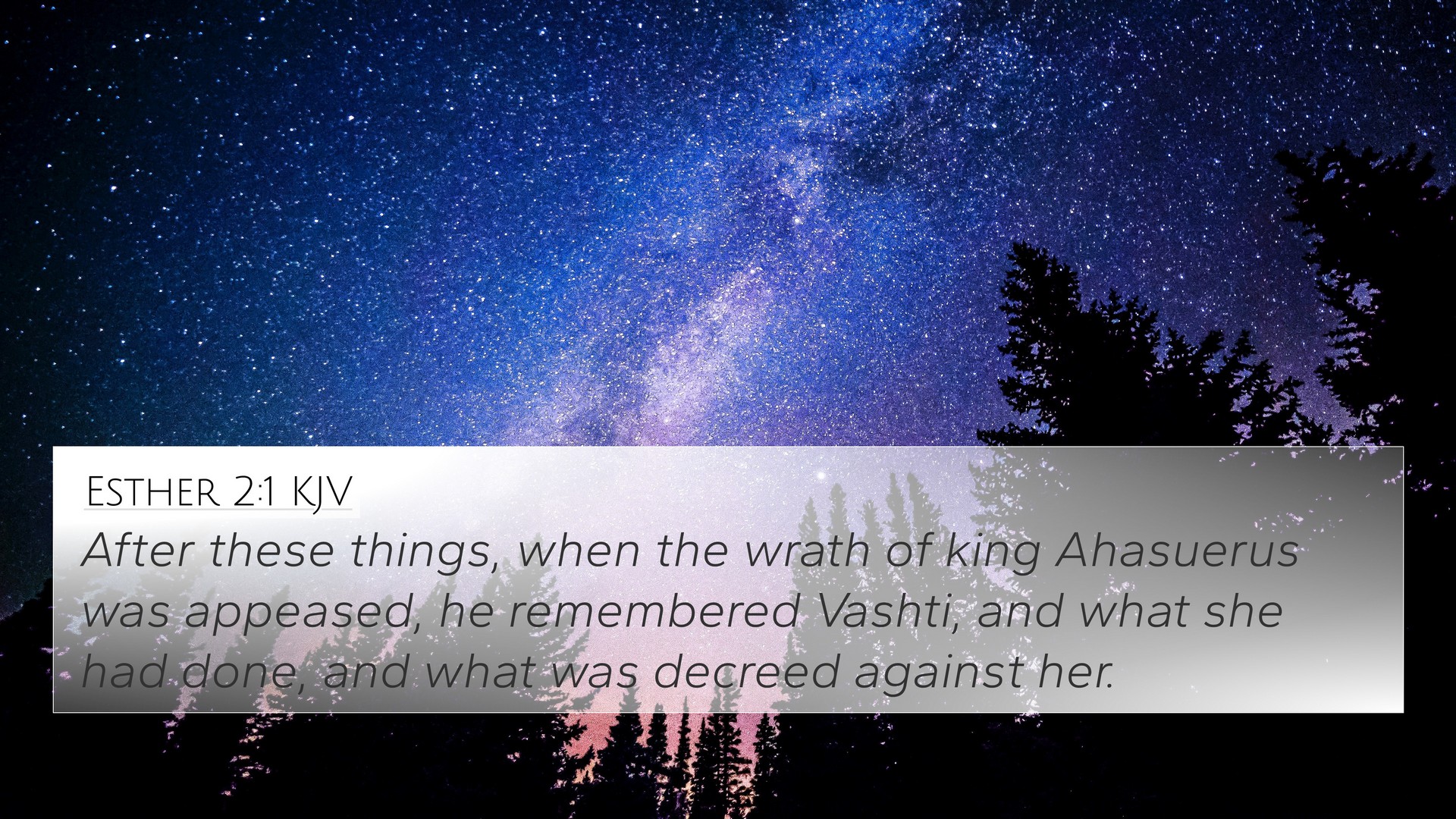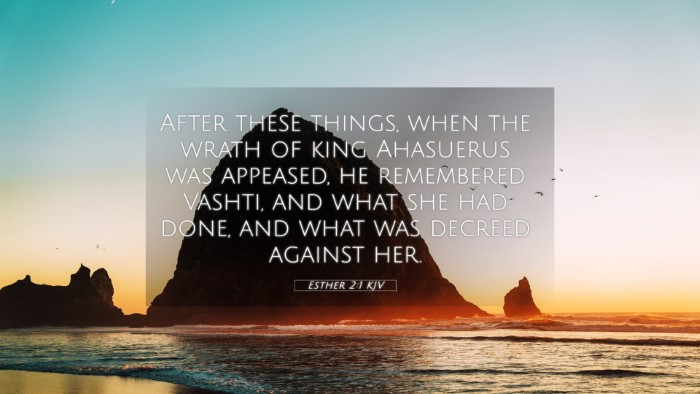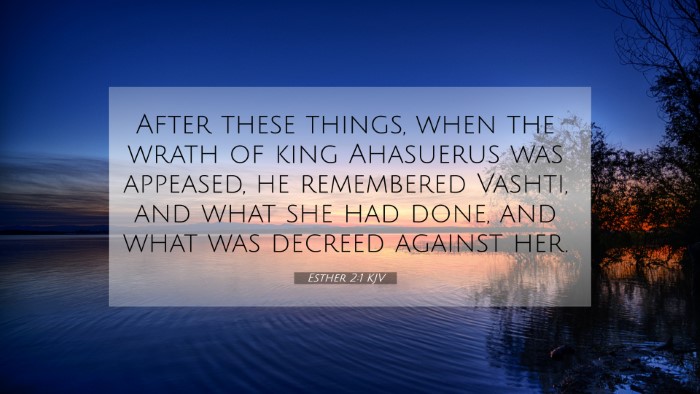Old Testament
Genesis Exodus Leviticus Numbers Deuteronomy Joshua Judges Ruth 1 Samuel 2 Samuel 1 Kings 2 Kings 1 Chronicles 2 Chronicles Ezra Nehemiah Esther Job Psalms Proverbs Ecclesiastes Song of Solomon Isaiah Jeremiah Lamentations Ezekiel Daniel Hosea Joel Amos Obadiah Jonah Micah Nahum Habakkuk Zephaniah Haggai Zechariah MalachiEsther 2:1 Similar Verses
Esther 2:1 Cross References
After these things, when the wrath of king Ahasuerus was appeased, he remembered Vashti, and what she had done, and what was decreed against her.
Uncover the Rich Themes and Topics of This Bible Verse
Listed below are the Bible themes associated with Esther 2:1. We invite you to explore each theme to gain deeper insights into the Scriptures.
Esther 2:1 Cross Reference Verses
This section features a detailed cross-reference designed to enrich your understanding of the Scriptures. Below, you will find carefully selected verses that echo the themes and teachings related to Esther 2:1 KJV. Click on any image to explore detailed analyses of related Bible verses and uncover deeper theological insights.
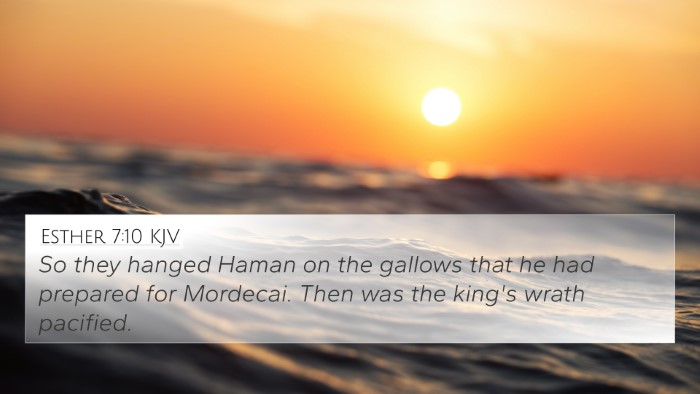
Esther 7:10 (KJV) »
So they hanged Haman on the gallows that he had prepared for Mordecai. Then was the king's wrath pacified.
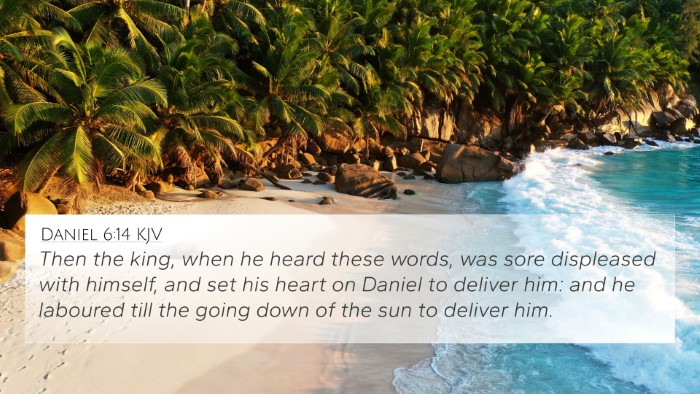
Daniel 6:14 (KJV) »
Then the king, when he heard these words, was sore displeased with himself, and set his heart on Daniel to deliver him: and he laboured till the going down of the sun to deliver him.
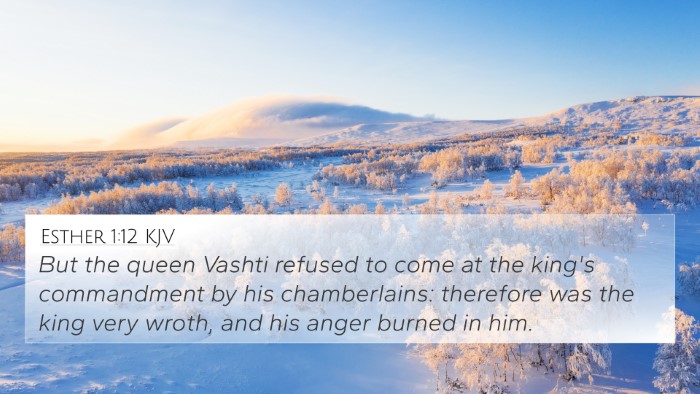
Esther 1:12 (KJV) »
But the queen Vashti refused to come at the king's commandment by his chamberlains: therefore was the king very wroth, and his anger burned in him.
Esther 2:1 Verse Analysis and Similar Verses
Understanding Esther 2:1
Bible Verse: Esther 2:1 - "After these things, when the wrath of King Ahasuerus was appeased, he remembered Vashti, and what she had done, and what was decreed against her."
Context and Overview
This verse occurs after a series of events in the Persian court, particularly the banishment of Queen Vashti due to her refusal to comply with King Ahasuerus' command to appear before him. The king's regret or reflection on this incident sets the stage for Esther's introduction into the narrative, as it speaks to the wider themes of power, regret, and divine timing in the unfolding story of the Jewish people in exile.
Commentary Insights
-
Matthew Henry's Commentary:
Henry reflects on the volatility of kings and the consequences of pride and rebellion. King Ahasuerus’ decision to remember Vashti after his anger subsided indicates a shift towards reflection and decision-making that is pivotal for the future of Esther and the Jewish community.
-
Albert Barnes' Notes:
Barnes highlights the importance of the phrase "after these things," noting that it connects the events of the chapter to the previous account of King Ahasuerus' anger and the expulsion of Queen Vashti. This contemplation suggests a theme of restoration and the king's reconsideration of his earlier decisions.
-
Adam Clarke's Commentary:
Clarke interprets this verse as a significant moment in the narrative, emphasizing the influence that Vashti's actions have on subsequent events. His commentary suggests that the king’s change of heart is a pivotal moment that leads directly to Esther’s rise and the eventual salvation of the Jewish people.
Thematic Connections
Esther 2:1 illustrates themes of:
- The consequences of disobedience and the fickle nature of human emotions.
- The idea of divine providence and timing, as Esther’s rise to prominence is linked to the king’s reconsideration of Vashti.
- The role of women in the narrative, highlighting both subjugation and agency through Vashti and Esther.
Bible Cross-References
This verse connects thematically to several other passages in the Bible, including:
- Esther 1:10-12: The original command to Vashti that leads to her removal.
- Esther 1:19: The decree that resulted from Vashti’s disobedience.
- Proverbs 21:1: “The king's heart is in the hand of the Lord, as the rivers of water: he turneth it whithersoever he will.” - Highlighting divine intervention in royal decisions.
- Isaiah 55:8-9: “For my thoughts are not your thoughts, neither are your ways my ways.” - Reflecting God’s higher planning over human affairs.
- Romans 8:28: Promise that all things work together for good to those who love God, fitting well in the narrative of Esther’s eventual success.
- 1 Peter 5:6: “Humble yourselves therefore under the mighty hand of God, that he may exalt you in due time.” - Connecting to Esther’s humility and eventual elevation.
- Matthew 12:36-37: The importance of our words and actions, relevant when considering Vashti’s choice.
Roles of Historical Context
Understanding the context in which Esther lived provides deeper insights into this verse. Political dynamics, social customs, and the status of women in ancient Persia all work together to frame the narrative. Ahasuerus’ reflection on Vashti’s deed after regaining composure points to a realm of emotions that transcend simple narratives, inviting readers to consider how trauma and loss can lead to moments of reflection.
Conclusion
The events encapsulated in Esther 2:1 function as a bridge to the unfolding drama of the Book of Esther, where themes of power, identity, and divine providence coalesce. For those seeking to explore the connections between Bible verses, this verse serves as a key reference point that opens pathways to understanding broader biblical themes through cross-referencing tools and methodologies.
Further Study Suggestions
For those interested in deeper engagement and cross-referencing related themes, consider utilizing:
- Bible concordance tools for tracing recurring themes.
- Cross-reference Bible study methods to explore relational dynamics between characters.
- Identifying connections between Old and New Testament accounts to enrich understanding of overarching themes.
- Comparative studies of prophecies and fulfillments through different biblical texts.
